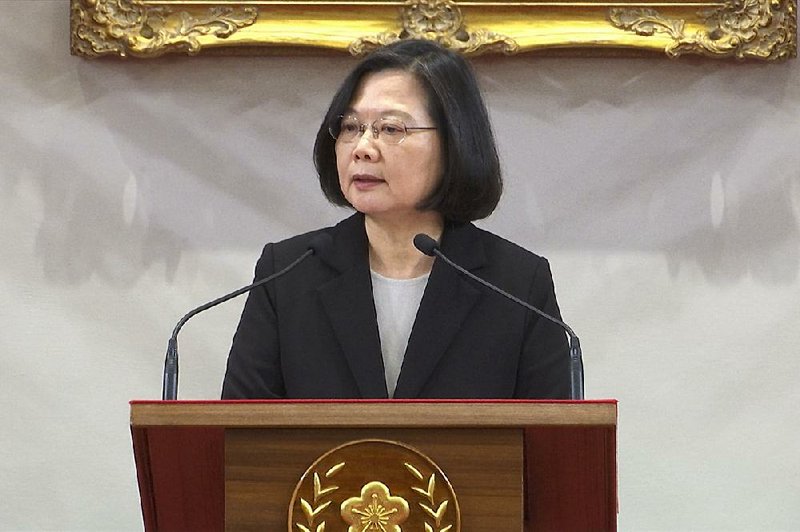BEIJING -- Taiwan's leader on Wednesday rejected the Chinese president's call for unification under a "one country, two systems" approach.
President Tsai Ing-wen said Wednesday that China must face the fact of the existence of the Republic of Taiwan. She made the statement to the news media hours after Chinese President Xi Jinping said in a policy speech on Taiwan that no one can stop the trend toward unification.
Xi, declaring that independence is not an option for Taiwan, urged both sides to reach an early consensus on unification and to not leave the issue for future generations. He said independence for the self-governing island is against history and a dead end.
"We are willing to create a vast space for peaceful unification, but we will never leave any room for any sort of Taiwan independence separatist activities," he said.
Tsai rejected his call just hours later.
"China must face the fact of the existence of Taiwan, Republic of China, and not deny the system of a democratic country that has been commonly built up by the Taiwanese people," she said.
Taiwan, an island of 23 million people, split from China in a civil war that brought the Communist Party to power in China in 1949. The rival Nationalists set up their own government on the island about 100 miles off the Chinese mainland.
Xi proposed talks between the two sides to work out "a systematic arrangement for the peaceful development of the cross-strait relationship."
Tsai said Taiwan is willing to talk but that it must be with the approval of the Taiwanese people. She has irked Beijing by refusing to endorse the "one China" principle that designates Taiwan as a part of China.
"Deviating from the one China principle will result in tension and turbulence in cross-strait relations, harming the interests of the Taiwanese compatriots," Xi said.
He pledged that a one-country, two-systems framework would respect the Taiwanese social system and way of life and guarantee property rights, religious beliefs and other rights.
"The political disputes that have existed for a long time ... affect the healthy and continuous development of the cross-strait relationship and cannot be passed from generation to generation," Xi said.
He warned against foreign interference in the issue, though he didn't mention the United States by name. People on both sides of the strait belong to the same family, he said, and family matters should be resolved by family members.
Xi said China reserved the right to use force if necessary to counter interference by external forces and what he called an extremely small number of Taiwanese separatists.
"Foreign interference is intolerable," Xi said.
In the past two years, China has cut direct talks with Taipei, stripped Taiwan of its diplomatic allies and flown bombers and dispatched navy vessels around the island in displays of force.
In November, Tsai's party, which leans toward declaring formal independence and is anathema to the mainland government, lost in nationwide local elections, a development that Beijing cheered as a signal that Taiwanese voters rejected her anti-China stance.
Pre-empting Xi's anticipated speech by a day, Tsai said in a New Year's Day address that her loss at the polls in November had nothing to do with Taiwanese voters' willingness "to abandon our sovereignty," and she accused China of interfering in Taiwan's election.
Information for this article was contributed by Ken Moritsugu and Yu Bing of The Associated Press and by Gerry Shih of The Washington Post.
A Section on 01/03/2019
